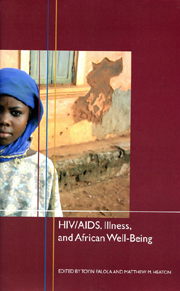Book contents
- Frontmatter
- Contents
- Acknowledgments
- Part I Context
- Part II Illness Case Studies
- Part III Globalization, Development, and Health
- 7 The Microbial Rebellion: Trends and Containment of Antimicrobial Resistance in Africa
- 8 Development and the Epidemiologic Transition in Sub-Saharan Africa
- 9 The Economic Burden of Buruli Ulcer Disease on Households in Rural Ghana
- 10 Health Issues in a Mining Community in South Africa
- 11 Globalization, Health, and the Hajj: The West African Pilgrimage Scheme, 1919–38
- Part IV HIV/AIDS
- List of Contributors
- Index
- Rochester Studies in African History and the Diaspora
10 - Health Issues in a Mining Community in South Africa
from Part III - Globalization, Development, and Health
Published online by Cambridge University Press: 05 February 2013
- Frontmatter
- Contents
- Acknowledgments
- Part I Context
- Part II Illness Case Studies
- Part III Globalization, Development, and Health
- 7 The Microbial Rebellion: Trends and Containment of Antimicrobial Resistance in Africa
- 8 Development and the Epidemiologic Transition in Sub-Saharan Africa
- 9 The Economic Burden of Buruli Ulcer Disease on Households in Rural Ghana
- 10 Health Issues in a Mining Community in South Africa
- 11 Globalization, Health, and the Hajj: The West African Pilgrimage Scheme, 1919–38
- Part IV HIV/AIDS
- List of Contributors
- Index
- Rochester Studies in African History and the Diaspora
Summary
Health issues in mining communities in South Africa are unique because of the nature of the mining industry. The illnesses and diseases that will be discussed in this chapter are not exclusive to the mining industry, but it is the risk factors associated with the mining environment and communities that exacerbate the incidence of these illnesses and diseases and make the subject matter burning and relevant.
The unique characteristics of the mining environment in South Africa are that mining communities are mainly isolated, originally rural with high illiteracy rates, and consequently, they become dependent on the mining companies for their livelihood and development. The rural-based environment often becomes barren and ugly from large-scale excavation. In addition, communities are often exposed to toxic environmental hazards from mine operation wastes. Mining is by its nature a temporary activity because of its dependence on the available mineral deposits. It is also fast growing and generates high earnings for the mining corporations, which has an impact on the local communities, who are usually unable to respond to this across-the-board momentum because of their rural background. Consequently, the local population experiences cultural shock and does not respond effectively to the developmental changes, occupational skills requirements, and rapid change from an agricultural-based society to a cash-dependent environment. This has resulted in companies depending on labor from elsewhere.
- Type
- Chapter
- Information
- HIV/AIDS, Illness, and African Well-Being , pp. 210 - 242Publisher: Boydell & BrewerPrint publication year: 2007



